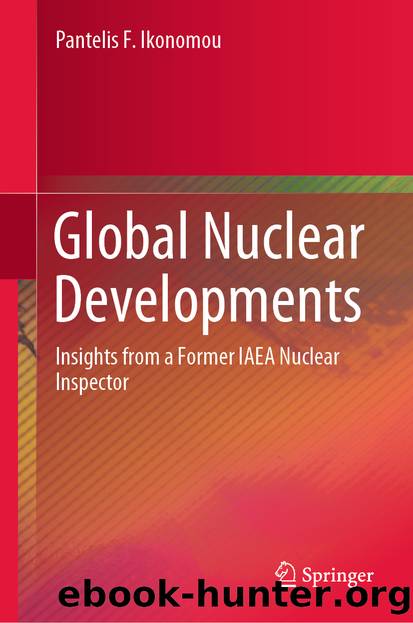Global Nuclear Developments by Pantelis F. Ikonomou

Author:Pantelis F. Ikonomou
Language: eng
Format: epub
ISBN: 9783030469979
Publisher: Springer International Publishing
5.2 Saudi Arabia
Saudi Arabia continues to see Iran’s nuclear agreement, the JCPOA, as an unacceptable deal, risky and harmful to its national interests. The Kingdom of Saudi Arabia is one of the states in the Middle East, together with Israel, that did not want the solution of the Iranian crisis without a humiliating defeat of Iran.
For decades Saudi Arabia has been considering its neighbor to the East, Iran, as an antagonist and a threat. Both countries are vying for political and economic leadership in the Gulf region and the Middle East. They also have diverging leanings in global geopolitics. After 1979 and the Iranian Revolution Iran turned against the United States, while Saudi Arabia remained a close ally. They also both see themselves as leaders of the Sunni and the Shia communities respectively.
Citing the unsatisfactory conclusion of the P5+1 negotiation with Iran, it is likely that Saudi Arabia will proceed with the development of a nuclear program. According to Saudi Arabia the most unsatisfactory outcome of Iran’s nuclear crisis through the JCPOA is that Iran could retain, albeit very limited, the capacity to enrich uranium, an activity otherwise compatible with the NPT conducted already by other NNWS such as Japan, Germany, Holland, etc. (see Annex VI).
Saudi Arabia is a financially strong country and could invest heavily in such a pursuit, either to buy the required technology or expertise. It could carry out sensitive activities of the nuclear fuel cycle, such as uranium enrichment, on the grounds of obtaining a “deterrent nuclear capability” against a neighboring nuclear threat.
Precisely in this view, Saudi Arabia’s prince Turki bin Faisal, former powerful intelligence chief of the country, has stated during the Munich Security Conference in February 2014: “Any final agreement that would allow Iran to maintain an enrichment capacity would force Saudi Arabia and other Arab states to invoke their right to enrich uranium. I believe that we must insist on the validity of equal rights for all, as stipulated by the international Treaty of Non-proliferation of nuclear weapons”.
Saudi Arabia maintains particularly close relations with Pakistan, which is a de facto NWS, that is a non-NPT nuclear power possessing nuclear weapons and the know-how to construct them. Pakistan has a rather suspect past in supporting other countries to an illegal acquisition of nuclear weapons and this is a concern for many states and their competent authorities. The great financial support of Saudi Arabia to Pakistan in the past prompted some analysts to even claim that the Royal House of Riyadh has already “pre-paid” Islamabad for the nuclear bomb”.
In 2012 Saudi Arabia announced a huge peaceful nuclear program, including the construction of 16 nuclear power reactors to 2030, with a total cost of more than 100 billion US dollars.
After the 110 billion dollar military economic-trade-agreement of the American President Trump with Riyadh, whose details were not made known, it is argued that the Saudis may have ensured the non-observance of the “Golden Standard” of the NSG—the ban on acquiring uranium enrichment capabilities—thanks to their colossal nuclear agreement with the US [29].
Download
This site does not store any files on its server. We only index and link to content provided by other sites. Please contact the content providers to delete copyright contents if any and email us, we'll remove relevant links or contents immediately.
| Atomic & Nuclear Physics | Particle Physics |
The Complete Stick Figure Physics Tutorials by Allen Sarah(6639)
Secrets of Antigravity Propulsion: Tesla, UFOs, and Classified Aerospace Technology by Ph.D. Paul A. Laviolette(3450)
Thing Explainer by Randall Munroe(3328)
The River of Consciousness by Oliver Sacks(2992)
The Order of Time by Carlo Rovelli(2714)
I Live in the Future & Here's How It Works by Nick Bilton(2526)
How To by Randall Munroe(2476)
A Brief History of Time by Stephen Hawking(2474)
The Great Unknown by Marcus du Sautoy(2186)
What If?: Serious Scientific Answers to Absurd Hypothetical Questions by Randall Munroe(2170)
Blockchain: Ultimate Step By Step Guide To Understanding Blockchain Technology, Bitcoin Creation, and the future of Money (Novice to Expert) by Keizer Söze(2138)
Midnight in Chernobyl by Adam Higginbotham(2079)
Networks: An Introduction by Newman Mark(1998)
The Meaning of it All by Richard Feynman(1909)
Easy Electronics by Charles Platt(1864)
The Tao of Physics by Fritjof Capra(1850)
When by Daniel H Pink(1777)
Midnight in Chernobyl: The Untold Story of the World's Greatest Nuclear Disaster by Adam Higginbotham(1775)
Introducing Relativity by Bruce Bassett(1755)
